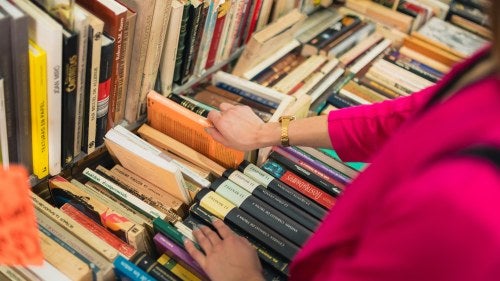Chicago's Wide World of International Literature

Thanks to a passionate group of independent presses, bookstores, and translators, the city’s foreign lit scene is thriving.
Chicago has long been a destination for immigrants from across the globe, especially those from Europe, Mexico, and Central America. This made the city a melting pot of cultures, which bled into Chicago’s literature scene. The city is home to a breadth of businesses focused on international works, from a shop that sells Franco-Belgian comic books to a publisher producing translated works from Spain and across Latin America.
“Chicago is a very international city, with communities from all over the world and major universities that support the languages and literatures of many countries and regions,” Jason Grunebaum, a co-director of a University of Chicago project to help produce translated South Asian literature, told ChicagoGlobal. “The community dedicated to bringing voices from other languages into English and to Chicago reflects this diversity.”
The Path to Publishing Underrepresented Works
South Asian languages – like Bengali and Sanskrit – make up 20% of the world’s languages, Grunebaum said, but literary works translated from these languages make up less than 1% of all translated titles in the United States. The South Asian Literature in Translation program from the University of Chicago, known as SALT, aims to help close that gap.
“What SALT does is make targeted interventions at various points in the process that we hope will have a big impact on bringing translated literature from South Asia to the Western Anglosphere,” Grunebaum said.
Some of those interventions, like helping train new translators, happen well before a book is ready for production. Others, like travel grants to help publishers discover new talent in South Asia or help translators meet with authors in person, focus on people and companies already in the literary pipeline.
The program just launched in June 2023, but it aims to have a hand in publishing more than 40 books in at least 16 different languages by 2028.
Grunebaum, who works independently as a translator in addition to leading SALT, said it’s no coincidence that such a program would spring up in the Windy City.
“There's a very active international literature scene here, in no small part due to the activity of the Third Coast Translators Collective,” he said. “Its 30-plus members who translate from some 20 languages are doing amazing work as both translators and activists — often two sides of the same coin — in making international literature in translation more visible in Chicago.”
Another marquee part of Chicago’s international-literature community is Swan Isle Press. Founded by Chicago native David Rade in 2000, Swan Isle is a nonprofit publisher that focuses on translated works of Spanish and Latin American fiction, nonfiction, and poetry.
Rade first fell in love with translated literature as a young reader. The subject became a professional interest once he got to know Chicago’s large Latin American writing community. “It became clear that there were many talented writers and poets here,” he says, but the publishing ecosystem to support them was lacking. “In the year 2000, when Swan Isle Press published its first books, there was that sense of an unmet need, even a hunger, for translated Spanish-language publications and bilingual editions for the growing Hispanic population throughout the United States.”
Rade established his press as a nonprofit so he could focus on translating the very best Spanish-language works available, not just those with mass-market appeal.
“As an editor, I wanted to work on books by writers, poets, who might not be necessarily well-known, and yet would transcend borders, build bridges.”
Along with his family roots in the city, Rade says that Chicago’s strong literature scene, its diverse and multilingual population, and its network of multicultural organizations all helped sway him to set up shop here.
“Chicago, for writers, poets, artists, publishers, has always been an inspiring, tough, diverse, fertile ground,” Rade said.
From Manga to Tintin, Comic Books Are in Demand
In addition to the local organizations working to publish translated literature, Chicago also has several businesses focused on selling international works. Schoenhof’s Foreign Books, a national leader in sales of international titles, has its headquarters in Skokie, and, on the South Side, the bookstore Seminary Co-op has an impressive collection of foreign-language works, due in part to its proximity to the multilingual University of Chicago community.
There’s also Howling Pages. The Portage Park comic and graphic novel store describes itself as “a curated collection of the world’s best comics,” and European comics and manga are two of its primary specialties. Owner Alain Park said one of his goals when opening the shop in 2022 was to help promote these international stories.
Park’s mother is Belgian, so his childhood included lots of Franco-Belgian comic books, starring influential characters like Tintin and Asterix. “But I grew up here, so I also had the American side,” he told ChicagoGlobal. “That's where my focus of the shop came from. It's two fronts.”
Park worried at first that the store could get lost amid Chicago’s robust comics scene, but so far, the response has been strong. Howling Pages received over $16,000 in crowdfunding to help finance its opening, and Park says a surprising number of customers have either been familiar with Euro comics already or open to learning about them.
“Since the world of comics is so big,” he said, “the slice that we’re offering doesn’t really overlap with very many existing places.”
Young People Want Translated Works
The demand for translated works has been on the rise, with sales of translated fiction in 2022 up nearly a quarter from 2021. Much of this has to do with a demand from young readers, who make up almost half of translated fiction sales.
Grunebaum said this increase in demand is a rising tide that lifts up the translators along with the authors.
“Translators have long been fighting for and are now enjoying greater visibility than they used to get as artists and writers in their own right,” he said. “There are groundbreaking podcasts dedicated to foregrounding the translation community. And behind all of these heartening trends are communities of literary translators and publishers working tirelessly day in and day out to bring voices from all over the world into English.”
Despite that increase in interest, Rade noted that only 3% of all books published in the U.S. are works in translation.
“That demand, growth, let alone sales, wouldn’t be characterized as exponential,” Rade said. “Any publisher will tell you, large or small, that publishing literature in translation is more time-consuming and costly. It entails greater levels of economic risk and commitment than publishing mass-market or trade books by authors who write in English and are already familiar to readers.”
But even with these challenges, Rade said Swan Isle’s mission remains to build bridges between cultures and languages.
“Chicago is not just our home,” he said. “It is home to many great authors, translators, and artists. World literature publishers can always benefit from being part of this vibrant, multicultural, multilingual community.”
This story first appeared in the ChicagoGlobal newsletter, a joint project of Crain's Chicago Business and the Chicago Council on Global Affairs.

